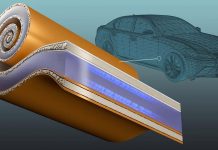
Electric cars today mainly use lithium-ion batteries.
These batteries are decent. They can store a good amount of energy compared to their size and can be recharged whenever you like without much worry.
However, there are some issues with them. For instance, they can catch fire, and their energy storage isn’t perfect for every need. That’s why scientists are exploring other options.
One promising alternative is the “solid-state battery.” Researchers from NTNU’s Department of Materials Science and Engineering, including Professor Daniel Rettenwander, have been studying this.
They have been working with teams from Austria, Germany, and the U.S., and their findings were shared in the journal Nature Communications.
This research can help in making solid-state batteries more popular and ready for bigger markets.
Why Solid-State Batteries?
Solid-state batteries have some big pluses over the usual lithium-ion batteries. Here are a few:
- More Power, Less Size: These batteries can store more energy while taking up less space and weight.
- Safety: Solid-state batteries can handle bigger temperature changes, which is great in extreme climates. Also, they’re less likely to catch fire. This is because, unlike lithium-ion batteries that have a liquid inside them that helps pass electricity (called a liquid electrolyte), solid-state batteries use solid materials.
- Currently Small-Scale: Right now, solid-state batteries are mostly used in things like pacemakers and small gadgets. Why? They’re still pricey to make in bigger sizes. But that might change as we find ways to produce them more cheaply.
One cool thing the research team is trying to do is make solid-state batteries charge faster. The main challenge?
Passing electricity through solid stuff is trickier than passing it through liquids.
Florian Flatscher, a Ph.D. student on the team, mentioned they’re figuring out how to charge these batteries more efficiently and quickly. This would be great for any device or car using these batteries. Faster charging can also make these batteries easier to recycle.
Like everything, solid-state batteries have challenges. For one, they use lithium, just like the usual car batteries. Sometimes, this lithium can cause issues in solid-state batteries by forming something called “dendrites.”
Imagine these as tiny, unwanted growths. If they grow too much, they can cause shorts in the battery. The team has discovered more about why this happens and how to stop it. Flatscher says understanding and preventing this is a big win for safety.
While solid-state batteries cost more than regular batteries now, that might change as more and more are made. Some car companies have even said they’re working on cars with these batteries, and we might see them on the roads by 2024.
Electric cars could get a big upgrade with solid-state batteries. These batteries are safer, can charge faster, and might soon be more affordable.
With ongoing research and understanding, the future looks bright for this technology.
Follow us on Twitter for more articles about this topic.



